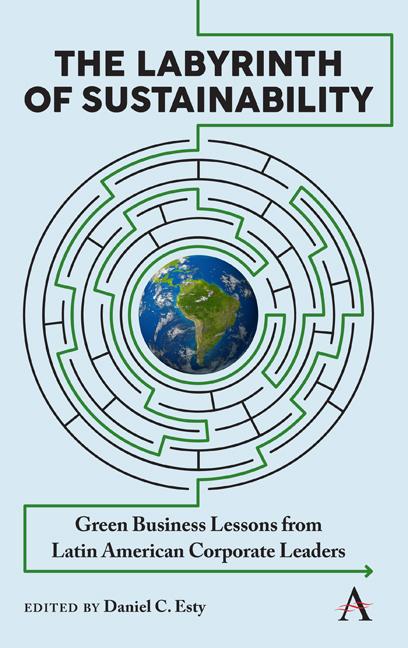Book contents
- Frontmatter
- Dedication
- Contents
- List of Illustrations
- Acknowledgments
- Notes on Contributors
- Introduction
- Chapter 1 Water Conservation in Scarcity Conditions: Corporate Sustainability at Mexico's FEMSA Group
- Chapter 2 Walmart Mexico: Clean Energy to Reduce Costs and Improve Corporate Image
- Chapter 3 Grupo Vanguardia Revitalizes Plastics Recycling in Honduras
- Chapter 4 Nissan Mexicana's Renewable Power Partnership
- Chapter 5 Tecnosol Follows the Sun
- Chapter 6 Rizek Pushes the Dominican Republic Cocoa Industry toward Sustainability
- Chapter 7 Centrosur Leads the Way to Sustainability in Ecuador
- Chapter 8 A Resilient World: Bavaria Builds Its Case on Water
- Chapter 9 Grupo Herdez Takes the Initiative in Mexico's Food Market
- Chapter 10 Chile's Las Palmas Avocado Orchard: Water Consumption Reduction in Agriculture
- Chapter 11 Mabesa: Increasing Global Competitiveness with Eco-friendly Disposable Products
- Chapter 12 Water Use Efficiency Initiatives in Nestlé's Value Chain and the Implications of the Company's Business Model
- Notes
- Index
Chapter 10 - Chile's Las Palmas Avocado Orchard: Water Consumption Reduction in Agriculture
Published online by Cambridge University Press: 29 May 2019
- Frontmatter
- Dedication
- Contents
- List of Illustrations
- Acknowledgments
- Notes on Contributors
- Introduction
- Chapter 1 Water Conservation in Scarcity Conditions: Corporate Sustainability at Mexico's FEMSA Group
- Chapter 2 Walmart Mexico: Clean Energy to Reduce Costs and Improve Corporate Image
- Chapter 3 Grupo Vanguardia Revitalizes Plastics Recycling in Honduras
- Chapter 4 Nissan Mexicana's Renewable Power Partnership
- Chapter 5 Tecnosol Follows the Sun
- Chapter 6 Rizek Pushes the Dominican Republic Cocoa Industry toward Sustainability
- Chapter 7 Centrosur Leads the Way to Sustainability in Ecuador
- Chapter 8 A Resilient World: Bavaria Builds Its Case on Water
- Chapter 9 Grupo Herdez Takes the Initiative in Mexico's Food Market
- Chapter 10 Chile's Las Palmas Avocado Orchard: Water Consumption Reduction in Agriculture
- Chapter 11 Mabesa: Increasing Global Competitiveness with Eco-friendly Disposable Products
- Chapter 12 Water Use Efficiency Initiatives in Nestlé's Value Chain and the Implications of the Company's Business Model
- Notes
- Index
Summary
Abstract
This case study reviews the best sustainable water use practices of the Las Palmas avocado orchard, located in the Aconcagua valley of central Chile. Although this fertile agricultural region sits in the heart of Chile's wine country, it has suffered from drought in recent years. As food demand continues to grow in a world with more than seven billion people, food producers in Chile and around the world need to improve their stewardship of water resources. Las Palmas exemplifies a host of water-saving strategies, including high-density planting, crop selection, and soil moisture sensors to control precision irrigation. The implementation of these sustainable practices allows a water-dependent orchard to increase competitiveness, reduce operational costs, mitigate risk, and add value to products.
Introduction
According to the United Nations, 70 percent of global water withdrawals are linked to food and agriculture. Everything that we eat needs water to survive and grow. The stress on water resources will only get worse as global population increases and demand for food rises. Economic development will also increase the demand for fruits and vegetables, such as avocados, tangerines, and grapes, that will, in turn, require more water to produce. One Chilean company is working to address this challenge by reducing the amount of water it needs to grow avocados.
This case study will focus on the best sustainable water use practices of the Las Palmas avocado orchard. Located in the fertile Aconcagua valley, 60 miles north of Chile's capital Santiago, Las Palmas comprises 1,972 acres of fruit-producing trees, including tangerines, table grapes, wine grapes, and avocados. Avocados account for half of the orchard's planted surface. In recent years, the surrounding valley has suffered from periods of prolonged drought. This chapter will show how the company has implemented initiatives to save water and provide environmental, social, and economic benefits.
The Jorge Schmidt y Compañía Limitada, founded by Jorge Schmidt in 1986, owns Las Palmas, other orchards, and two other agricultural companies in the area— Desarrollo Agrario S.A. and Agricola Alto Aconcagua Ltda. These three companies combined employ more than 1,650 people and manage upward of 4,500 acres of productive agricultural plantations. The companies grow avocados, tangerines, and grapes (see Table 10.1).
- Type
- Chapter
- Information
- The Labyrinth of SustainabilityGreen Business Lessons from Latin American Corporate Leaders, pp. 141 - 154Publisher: Anthem PressPrint publication year: 2019

